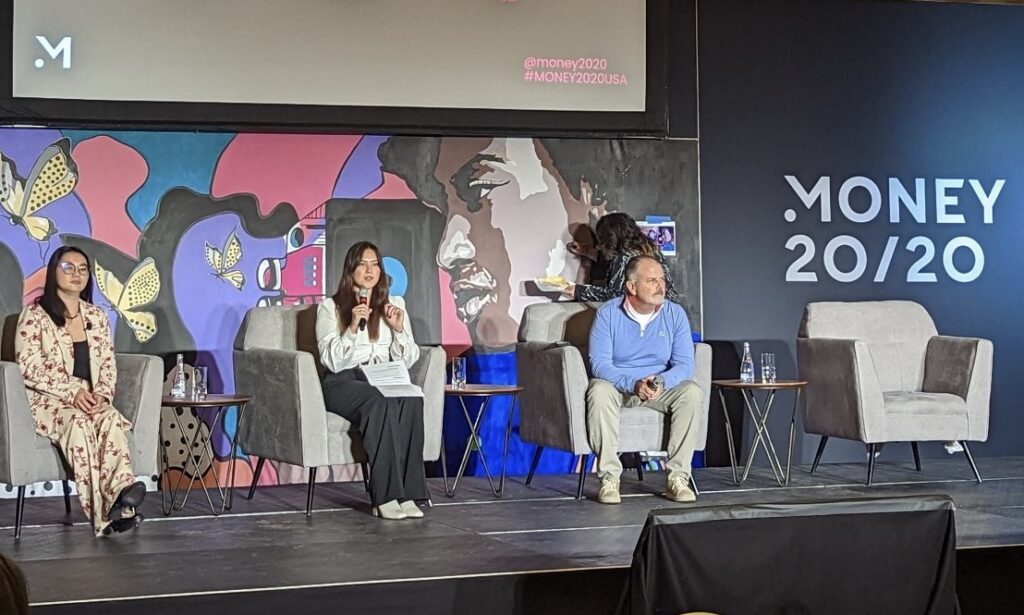27 October 2022 | FinTech
Media’s Role in Fintech Diversity
By
All over the world, in every country and every culture, storytelling has significant power.
On the Money 20/20 stage, I had the opportunity to discuss the connection between media representation and diversity in fintech.
I want to share some of my thoughts from the stage with you here.

To start, we have to remember that stories repeated in our minds interact with our biology.
Our brains need shortcuts to simplify and organize information and data constantly coming at us. As a result, they impact how we view the world and make meaning from what we perceive.
That means there is a direct connection between the representation of diverse communities in media and newsrooms and how it impacts investments in and perceptions of fintech as an industry.
Here’s how.
The narratives told create and continue prejudice by those who dominate the storytelling sphere.
And according to a Pew Research Center analysis, newsroom employees are still:
- 77% white
- 61% male
This is problematic because a more diverse staff is likely to produce a broader range of stories and perspectives.
For example, with a smaller percentage of newsrooms filled with women, women’s presence as news subjects in print, radio, and television only increased to 24% in 2015 from 17% in 1995.
I find it hard to believe it’s just a coincidence that the lack of representation in media is reflective of the lack of diversity in fintech leadership.
Like newsrooms, venture capitalists are still largely one demographic: 58% are white men.
And VC-backed startups are still significantly male (89.3%), white (71.6%), based in Silicon Valley (35.3%), and Ivy-educated (13.7%).
Media fuels the perceptions of our society but lacks diverse perspectives.
So how can we be surprised that our fintech industry, let alone any industry, lacks representation?
It’s clear that stories influence the perceptions of the polarizing fintech narrative, which, in turn, impacts funding dollars that go to women and diverse entrepreneurs.
It’s that simple.
Room for Improvement
Fintech will never improve its diversity figures if the community surrenders to this normalcy and becomes silent.
Not seeing yourself represented often leads to self-imposed limitations on what you can achieve and allows negative perceptions to go unchallenged.
We’re already seeing this personify in fintech, for example. Women represent only 30% of the fintech workforce, and 12% of fintech founders are women.
Of all fintech CEOs globally, 5.6% are women, and less than 4% of women hold the title of chief innovation or technology officer.
With stats like these, why would women or POC want to enter our industry?
The onus is on us to clean up the mess. I’m not saying it should be, but that’s the reality.
A huge part of the solution: Female and minority founders need to tell their stories to raise awareness.
As a journalist, it is my job to help women and POC be loud about their stories and ensure they are never forgotten.
As a woman of color, it’s my responsibility to create a safe space for women and POC to feel comfortable to share their stories.
That’s why I built WTFintech.
Narratives are what establish patterns and norms, and they are also what can inspire the next generation of founders.
When we are spotlighting narratives of women & people of color who are building, working, and investing in fintech, it can and will shape the future of our industry.
My call to action to women and POC founders and investors: Be loud about your story.
Now, I am aware of the struggle to do so as many founders admit that by being female or a person of color, they have learned not to push back against the system — and, in this case, their funding source.
What stops change is a community that surrenders to fear and becomes silent.
When we are louder together, we can change the narrative.
How to Tell Your Story
If you’re getting started exploring the ways you can share your personal story and maintain confidence, my advice is to start with reflection.
No one can tell your personal story better than you. It’s your gift and what will set you apart from the rest.
The more authentic, open, and honest you can be about yourself the better.
And like the queen herself, Serena Williams said, founders capable of sharing their personal stories have the secret sauce she’s looking for in her “Play to Win” strategy.
Start by asking yourself: Who were you before fintech entered your life?
Remembering past realities is the first step toward measuring the depth of change.
Sharing those personal measures – in the same way, we have learned to share problems and solutions – is the most impactful way of eliciting our history.
After all, if people of diverse experiences, genders, ethnicities, ages, and backgrounds begin to see patterns of similarity and write them down, then we could be on track to identify a more accurate historical pattern.
And, inherently, create solutions.
If you’re still unsure if sharing your story is right for you. I’d want you to remember that the average American spends over 11 hours a day watching, listening, reading, and interacting with media.
Being right there holds power to challenge and change perceptions.
The next time you see an ad or watch a film or TV show, ask yourself whose voice is telling the story.
We have to stop trying to retrofit women and POC into the white-dominated narrative society has already created for us and deems normal.
For the storytellers out here, I hope you strive to give a platform and voice for people to tell their own stories and shape their own identities so that in the future, we can show endless possibilities of who women and diverse people can be and what we can dream.